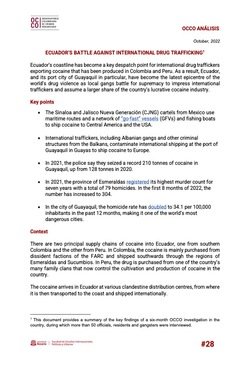By Mathew H. Charles
Ecuador’s coastline has become a key despatch point for international drug traffickers exporting cocaine that has been produced in Colombia and Peru. As a result, Ecuador, and its port city of Guayaquil in particular, have become the latest epicentre of the world’s drug violence as local gangs battle for supremacy to impress international traffickers and assume a larger share of the country’s lucrative cocaine industry. Key points • The Sinaloa and Jalisco Nueva Generación (CJNG) cartels from Mexico use maritime routes and a network of “go-fast” vessels (GFVs) and fishing boats to ship cocaine to Central America and the USA. • International traffickers, including Albanian gangs and other criminal structures from the Balkans, contaminate international shipping at the port of Guayaquil in Guayas to ship cocaine to Europe. • In 2021, the police say they seized a record 210 tonnes of cocaine in Guayaquil, up from 128 tonnes in 2020. • In 2021, the province of Esmeraldas registered its highest murder count for seven years with a total of 79 homicides. In the first 8 months of 2022, the number has increased to 304. • In the city of Guayaquil, the homicide rate has doubled to 34.1 per 100,000 inhabitants in the past 12 months, making it one of the world’s most dangerous cities.
University of Rosario, Observatorio Colombiano de Crimen Organizado (OCCO), 2022. 5p.



